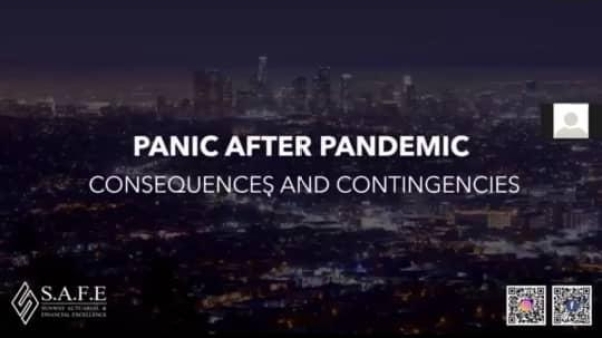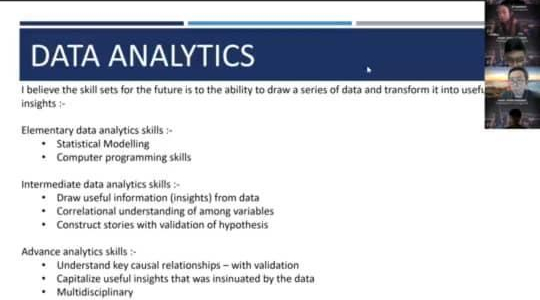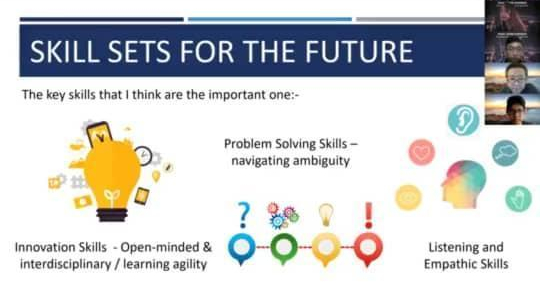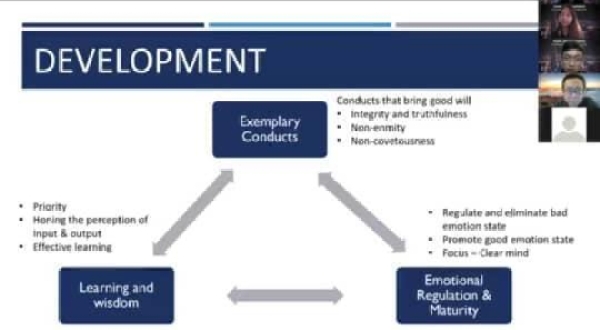Written by: Nivhya
Edited by: Pei Zoe

With the cloudy morning that hit on a fine Saturday morning of the 18th of July, the webinar conducted by Sunway’s Actuarial and Financial Excellence (S.A.F.E) has enlightened every participant with a bright introduction of the topic Panic After Pandemic: Consequences and Contingencies. Beginning with the rules and regulation that was fairly simple to be kept as a remainder to ensure a smooth webinar.

The speaker of this webinar was none other than Mr. Tan Kok How, who is an appointed actuary in Malaysia and Singapore. Mr Kok How is currently a financial risk director in a US company. With a background of various experiences relating to Actuarial and Financial industry, he has taken his time to share his knowledge concerning the current issue of the economic downfall due to the impact of COVID-19.
Mr Kok How surprised the fellow participants by mentioning his current location at that very moment, working from home in Pennsylvania. He also made a lighthearted joke about wanting to put up the same zoom background as the other S.A.F.E members before going into the content of his talk. COVID-19 has brought many uncertainties to our society as a whole-ranging from economic, social and emotional impacts. From the economic standpoint, a reduction in the gross domestic product (GDP), as well as the increase in labour cost, are expected. Based on the social standpoint whereby the social cost associated with the pandemic is immediate (morality impact, disruption services, stress on the health care system, disruption of education) as well as having it’s unknown but likely to be detrimental long term ramifications such as post- recovery effects or depression). Lastly, in the emotional standpoint where worry & anxiety, physical isolation and panic attacks could potentially lead to suicide.
Based on articles that Mr Kok How has researched on regarding the economic standpoint, according to the World Bank Group, a baseline pandemic scenario sees GDP fall by 2 per cent below the benchmark for the world with 2.5 per cent for developing countries and 1.8 per cent for industrial countries. In drastic scenarios, a drop of 4 per cent in GDP is possible. Consideration on the output of domestic services affected by the pandemic, as well as in traded tourist services which have the biggest GDP loss under the global pandemic scenario is expected in East Asia and Pacific (EAP) countries due to their relatively deep integration through trade and direct impact on tourism.
From a social standpoint, it has shown that the stress on the healthcare system has been rising drastically. As well as the disruption of services such as home health care, education and other contact-based services. With the strain of the virus mutating, it could be more infectious with the possible chances of a second wave of this pandemic. This pandemic has induced emotional turbulence that has led to suicidal ideation.
Moving on, the impacts of COVID-19 has resulted in many inconveniences in businesses, especially on contact related services. Many small industries are seriously hampered due to not being able to operate during the movement control order (MCO) period. In regards to insurances, it is no longer being bought but sold as the MCO might hinder the sales. The slowdown in the economy might also stall the new business. The whole scenario of this pandemic has increased the awareness of the need for medical coverage which causes a rise in the demand for medical insurance.

However, COVID-19 might have transformed the norm of doing business. There are some observations(anecdotal) towards various aspects. Firstly, the acceleration of digitization for business execution and productivity enhancement. Digitalization has always been by our sides but due to the current situation, it is being used at its full potential. Secondly, working from home which was established to follow social distancing requirements has increased work productivity as individuals can work from the comfort of their homes. Thirdly, the flourishing of online business or its derivatives. With the downfall of employment, online businesses have shone a bright light to ensure there is at least food on the table. Last but not least, adaptive behaviour change initiatives such as home delivery services. A convenience for bubble tea lovers to get their drink delivered right up to their doorsteps.
Mr. Tan Kok How believes that the skillsets for the future are having the ability to draw a series of data and transform it into useful insights. Elementary data analytics skills are based on statistical modelling and computer programming skills. Intermediate data analytics skills help to draw useful information( insights) from data, correlational understanding among variables and to construct stories with validation of hypothesis. Advanced analytics skills require the understanding of key causal with validation, capitalize useful insights that were insinuated by the data and multidisciplinary.

Data analytic is crucial during this pandemic as it provides the status of the dynamic(moving) and the static location of each individual across time (precise geo-time in individual). Leverages the epidemiological heat map underpinned by spatial and artificial intelligence (AI) capability to translate the spread of COVID-19 by relating the population dynamics and static geo-info across time. To obtain data, contact tracing cycle is used where the information is detected, isolated and then traced or the information if mobilised, tracked and then monitored. Prospective monitoring is basically to monitor the movement control order systematically and automatically for those identified as positive or in a state of quarantine. Retrospective tracing is where the potential places of congregation and potentially exposed individuals are identified by using positive cases past movement record’s time series. This method detects potential areas of concern based on the positive cases and/or the individuals (unidentified) with a high probability of being exposed via the artificial intelligence (AI) and/or statistical model.

With much analysing, the question arises on what is bound to happen to graduates that are affected by this pandemic and how to secure a stable job. Therefore, Mr. Tan Kok How has named a few basic skill sets needed for the future. Data analytics skills, programming skills, advance modelling skills and communication skills are a must knowledge to acquire. It is more of understanding a certain topic to ensure a smooth understanding to grab hold of upcoming opportunities. He has also provided key skills that he believes are important. Firstly, innovation skills. Having an open-minded and interdisciplinary or learning agility. Secondly, problem-solving skills to navigate ambiguity. Thirdly, listening and empathic skills.

Every individual has to develop themselves one way or another. Every career choice must maintain a balance in the flow. The first part consists of exemplary conducts that will bring goodwill such as integrity and truthfulness, non-enmity and non-covetousness. Following up with the second phase of which is emotional regulation and maturity. It is the ability to effectively regulate emotion and to be mindful under various situations. In short, it is an introspective journey and it is trainable. The third phase consists of learning and wisdom. Prioritising knowledge, honing the perception of input and output and the effects of learning.
Mr. Tan Kok How ended this lovely webinar with a piece of advice to all participants with this three-letter word. Wisdom, Passion and Confidence. Wisdom is to know and act according to the way that maximizes your benefits and others. To achieve wisdom it requires patience and emotional maturity which is the necessary condition for the support of the wisdom faculty to flourish and it is cultivable. Based on his experience, he encourages students to create their blessing. He advises to not associate with unwholesome people but to mingle around with people who are worthy of honour. Always to have reverence towards parents, teachers and bosses, humility, contentment and gratitude.


